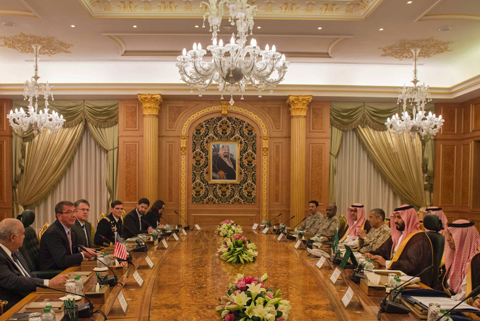 RIYADH: US Secretary of Defense Ashton Carter (second left) meets Saudi Deputy Crown Prince and Minister of Defense Mohammed bin Salman (second right) to discuss matters of mutual importance yesterday. - AFP
RIYADH: US Secretary of Defense Ashton Carter (second left) meets Saudi Deputy Crown Prince and Minister of Defense Mohammed bin Salman (second right) to discuss matters of mutual importance yesterday. - AFPRIYADH: The United States is seeking greater special forces and naval cooperation with the Gulf states to counter Iran's "destabilizing activities" in the region, a senior American official said. Defense Secretary Ashton Carter, who arrived in the Saudi capital yesterday, will meet his Gulf counterparts today. The following day he is expected to join President Barack Obama at a summit with monarchs of the six Gulf Cooperation Council states.
They will gather in an atmosphere of tension with regional leaders offended by Obama's perceived reluctance to get involved in the region's problems, and in particular his tilt towards Iran. The Gulf monarchies are worried after the lifting this year of international sanctions against their regional rival, Iran, under an international agreement to curb Tehran's nuclear program.
Riyadh and its neighbors fear the US-supported deal will only embolden Iran which they accuse of interference throughout the Middle East. Over the past 15 years the US has sold combat aircraft to Gulf states, but the senior American defense official said Iran's activities "won't be countered" in that way. Rather, "special operations forces and maritime interdiction" are needed, he said.
The US is proposing to help train Gulf special forces and to develop their naval capacity to prevent Iran from supplying Shiite groups that it supports in the region, the official said. In "just over a six month period we and our coalition partners were able to interdict four weapon shipments off the coast of Yemen", he said.
The United States provides precision-guided weapons and intelligence support to a Saudi-led military coalition that intervened in Yemen 13 months ago to support the government against Iran-backed rebels. Royal Saudi Air Force jets, many of them US-made F-15s, have carried out intensive air strikes against the rebels and their allies. The coalition maintains a naval blockade of Yemen. Carter will also repeat to his GCC counterparts the importance of increased support for Iraq, where the government is trying to reconquer territory seized by the Islamic State group of Sunni extremists.
"We are urging them to come in... provide funds and support, both political and economic, to the Iraqi government," the American official said. Saudi Arabia's ambassador to Iraq presented his credentials in January, re-establishing relations a quarter-century after they were cut following ex-president Saddam Hussein's invasion of Kuwait. "In a perfect world, we would see full diplomatic normalization between all Gulf countries and the Iraqi government," the official said. "There has been some reluctance among the Gulf states". On Monday in Baghdad, Carter announced new US support for the Iraqi government, including the deployment of an additional 217 military personnel.
Meanwhile, the US government is poised to approve two long-delayed sales of Boeing Co fighter jets to Qatar and Kuwait, and could announce the multibillion-dollar deals during Obama's visit, according to two sources familiar with the matter. Both deals have been stalled amid concerns raised by Israel that equipment sent to Gulf states could fall into the wrong hands and be used against it, and by the Obama administration's broader decision-making on military aid to the Gulf.
However, the Pentagon and the State Department both have signed off on the sale of some 36 F-15 fighter jets to Qatar and 24 F/A-18E/F Super Hornets to Kuwait, both built by Boeing. The White House is expected to follow suit shortly. The sale to Kuwait is worth about $3 billion and the one to Qatar is probably close to $4 billion, sources familiar with the matter said. "The last hurdle now is getting approval from the National Security Council and the White House," said one of the sources. The Pentagon had no immediate comment.
A senior Obama administration official said it was the administration's policy not to comment on potential arm sales until it has formally notified Congress of an intent to sell something. But, the official said, the United States is committed to the security and stability of the Gulf region and defense sales "fit into the overall US regional diplomatic strategy".
Senior US officials, including Navy Secretary Ray Mabus have publicly urged approval of the weapons sales, which will help maintain production of the fourth-generation Boeing fighter jets, while the newer and more advanced Lockheed Martin Corp F-35 fighter jet enters service in coming years. One senior US defense official said the Pentagon is keen to see the Boeing F-15 and F/A-18 production lines in St Louis continue and does not want to "foreclose any options on fourth-generation aircraft at this point".
Boeing already is spending "hundreds of millions" of dollars to buy long-lead materials such as titanium to prepare for a possible Kuwaiti order for F/A-18E/F Super Hornets and a separate US Navy order for 12 jets put on the service's "unfunded priorities" list submitted to Congress. The Navy is hoping that Congress will provide the funding to pay for the Boeing jets in fiscal 2017, although the planes were not included in its base budget request. It already has earmarked funding for more F/A-18E/F jets in fiscal 2018. A larger concern now is the Boeing F-15 line, which is set to end in 2019 after Boeing completes work on a large order for Saudi Arabia, unless a follow-on order is approved. - Agencies









